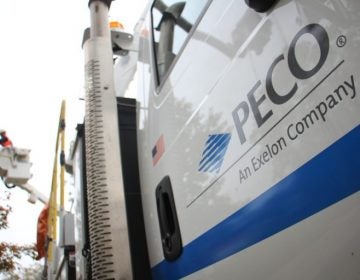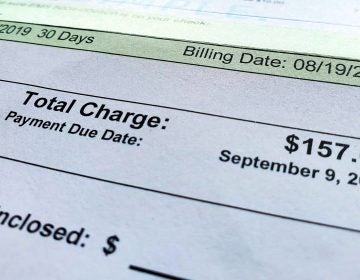Utility shutdowns can be a disaster. Here’s how to avoid them.
If you have a shutoff notice, the utility has a legal obligation to explain all the options you have to avoid a shutoff. Here are some options you have.

Utility fees can pile up - but there are steps you can take to pay off your bills, write staff members at Community Legal Services. (Martin Prescott/Getty Images/iStockphoto)
This article originally appeared on The Philadelphia Inquirer.
—
Iris is a mom with disabilities struggling to make ends meet on a fixed income. She tried to keep up with her utility bills, but with rising costs, she fell behind and couldn’t catch up. When Iris received a water shutoff notice, she grew desperate. Without water service, she wouldn’t be able to care for her daughter or stay safely in her home. Anxious to keep running water in her home, she came to a Utility Law Clinic arranged by Community Legal Services (CLS) at Face to Face Germantown.
Volunteer advocates supervised by the CLS Energy Unit assessed Iris’ options and represented her in applying, on the spot, for the city’s low-income water rate assistance program, “TAP” – the Tiered Assistance Program. Now enrolled in TAP, Iris gets an affordable monthly bill, and she’s no longer at risk of shutoff.
CLS has been piloting a new way to help low-income Philadelphians have access to affordable utility service. By partnering with neighborhood organizations like Face to Face Germantown, CLS can run a one-day Utility Law Clinic with volunteer advocates from law firms and law schools in Philadelphia. Representatives from Peco, the Gas Works, and the Water Department, as well as agencies like the Utility Emergency Services Fund, attend to try to resolve problems on the spot. CLS and Face to Face Germantown held another Utility Law Clinic on Monday.
For those who were unable to attend but are facing a utility shutoff, the CLS Energy Unit has some advice.
As soon as you receive a shutoff notice, contact the utility. If you have a shutoff notice, the utility has a legal obligation to explain all the options you have to avoid a shutoff. Here are some options you have to avoid a shutoff:
Enroll in a bill-affordability program. Contact your utility to find out if you are eligible for its bill-affordability program. Peco’s program is called CAP (Customer Assistance Program). PGW’s is called CRP (Customer Responsibility Program). PWD’s program is TAP. If you have previously been on CAP or CRP, ask the utility if there is a catchup or cure amount you can pay to get back on the program.
Apply for LIHEAP in the winter. LIHEAP (Low Income Home Energy Assistance Program) helps low-income individuals keep the heat on. The program usually runs from November through April, so keep an eye out for the application. LIHEAP can help you maintain service or get your service restored.
Apply for hardship funds. Check to see if there is grant assistance available to cover some or all of your bill. Visit your Neighborhood Energy Center for help with your application.
Ask for a payment arrangement. You can also ask the utility for a payment arrangement to help you catch up on the balance. Don’t agree to a payment arrangement that you will not be able to afford because the number of payment arrangements you can get may be limited.
Request a medical certificate. If someone in your household has a serious illness or medical condition, contact the utility and let it know. You may be eligible for a medical certificate – a form signed by your doctor that will give you a 30-day hold on the shutoff.
File a complaint. If you believe the utility has made a mistake in calculating your bill, has wrongfully denied your request for assistance, or should not be allowed to shut off your service, you can file a complaint with the utility. Contact the utility and tell it you’d like to “initiate a dispute.” You will be responsible for paying undisputed bills, but you should be able to keep your utility service while you are disputing the utility’s decision. If you are not happy with the utility’s decision on your dispute, you can appeal it.
Seek legal help. If you need legal help or advice, contact Community Legal Services. Come to walk-in hours Monday, Wednesday, or Friday from 9 a.m. to noon at either our Center City office (1424 Chestnut St.) or North Philly office (1410 W. Erie Ave.). Bring your bills and any documents about the dispute. You can also find self-help materials on our website at www.clsphila.org/get-help/utilities.
Robert W. Ballenger and Josie B.H. Pickens are supervising attorneys and co-directors of the Energy Unit at Community Legal Services of Philadelphia. Rebecca McCord is a community outreach coordinator for CLS’s Energy Unit, which advocates for affordable water, heat, and electricity services for low-income utility customers.
 The Inquirer is one of 21 news organizations producing “Broke in Philly,” a collaborative reporting project on solutions to poverty and the city’s push toward economic justice. See all of our reporting at brokeinphilly.org.
The Inquirer is one of 21 news organizations producing “Broke in Philly,” a collaborative reporting project on solutions to poverty and the city’s push toward economic justice. See all of our reporting at brokeinphilly.org.
WHYY is your source for fact-based, in-depth journalism and information. As a nonprofit organization, we rely on financial support from readers like you. Please give today.




